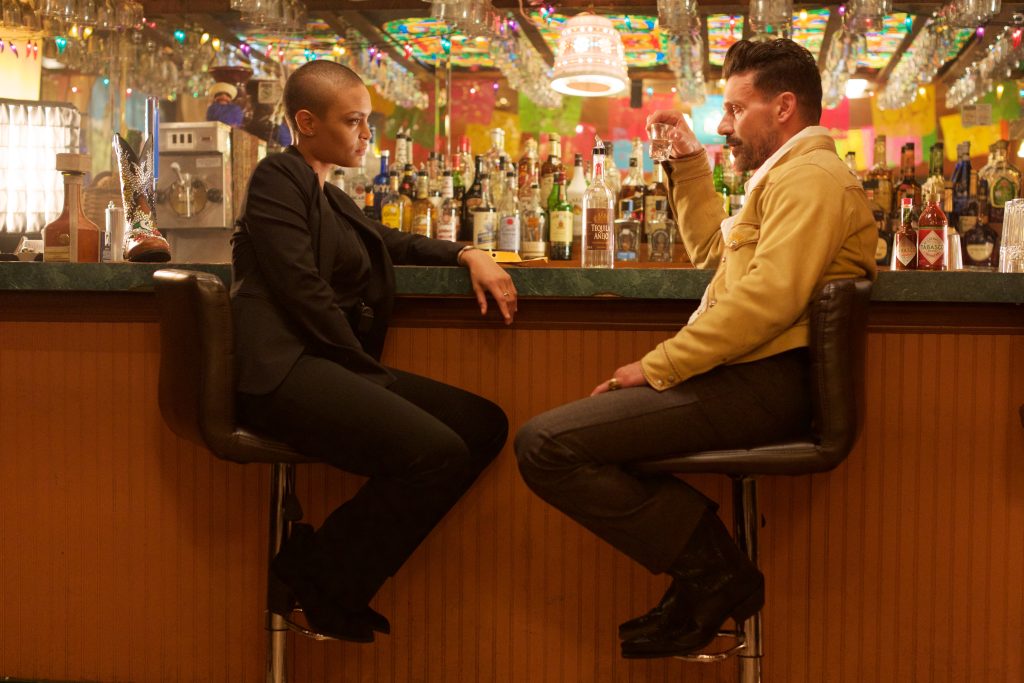March 8, 2024
by Carla Hay

Directed by Jeff Wadlow
Culture Representation: Taking place in New Orleans, the horror film “Imaginary” features a predominantly white cast of characters (with a few African Americans and Latin people) representing the working-class and middle-class.
Culture Clash: A children’s book author/illustrator with a traumatic past moves back into her childhood home, where one of her underage stepdaughters finds a mysterious teddy bear, makes it her imaginary friend, and unwittingly unleashes terror in the house.
Culture Audience: “Imaginary” will appeal primarily to people who don’t mind watching silly horror movies.

“Imaginary” could’ve been a campy horror classic about a menacing toy that unleashes terror. But this idiotic junk goes downhill quickly and becomes a boring mess with tacky-looking monsters. For a movie that uses the characters’ imagination as a crucial part of its plot, “Imaginary” lacks imagination for that plot, which becomes worse as the movie stumbles along to its very weak ending.
Directed by Jeff Wadlow, “Imaginary” was co-written by Wadlow, Greg Erb and Jason Oremland. The movie takes place and was filmed in New Orleans, but everything is so generic-looking about the locations in the movie, it really could’ve been filmed in many other cities, and it wouldn’t have made a difference to the story. “Imaginary” starts off as a basic horror movie, but the plot and dialogue get increasingly stupid, to the point where viewers will either laugh or get angry (or do both) at all the ridiculousness.
“Imaginary” begins by showing children’s book author/illustrator Jessica (played by Wanda DeWise) bursting through a minature door in the wall of the house. She looks terrified and says, “I’m sorry we couldn’t finish our game.” She’s soon grabbed by a large, burly man who has blood on him and whose eyes are all white from damage or because he’s possessed. He mumbles something about being afraid that Jessica is never coming back. It’s later revealed that the man chasing Jessica is her father Ben Barnes (played by Samuel Salary), who is a widower.
But surprise! This scene is nothing but a nightmare experienced by Jessica, who has been having several nightmares lately about her past. Jessica is newly married to a British-born musician named Max (played by Tom Payne), who has full custody of his two daughters from his previous marriage: 15-year-old sulky Taylor (played by Taegen Burns) and playful Alice (played by Pyper Braun), who’s about 7 or 8 years old. Taylor doesn’t like Jessica very much, while Alice is much more accepting and friendlier to stepmother Jessica.
Jessica’s father Ben is currently at an assisted living community called Azalea Acres. Jessica’s childhood home is currently vacant. And so, Jessica and Taylor decide that they will get a fresh start by moving the family from their small apartment into this house. And you know what that means in a horror movie where someone in the house is having nightmares about her past.
It doesn’t take long for Alice to find a teddy bear in the basement. She names the bear Chauncey. This toy bear becomes Alice’s constant companion and her imaginary friend. Jessica and Max often hear Alice talking to Chauncey, with the bear talking back in a voice that sounds a lot like Alice’s voice. Jessica and Max think all of this is adorable.
The family has a nosy neighbor named Gloria (played by Betty Buckley), who likes to lurk outside to see what’s going on in the house. When Jessica introduces herself to Gloria, Jessca is surprised when Gloria says that she used to be Jessica’s babysitter when Jessica lived in the house as a child. Jessica doesn’t remember Gloria at all. Jessica also doesn’t remember that she had a teddy bear that looked exactly like Chauncey.
“Imaginary” has several flashbacks to Jessica’s childhood, with Rhythm Hurd in the role of Jessica as a 5-year-old girl. The story of Jessica’s past is eventually revealed in bits and pieces. There are clues, such as the illustrations she used to draw on the house wall as a child. The phrase “never ever” is also repeated in the movie because it has a certain meaning.
Jessica has had a turbulent relationship with her father, who had a mental breakdown shortly after Jessica’s mother died when Jessica was 5 years old. Jessica has a burn scar on her arm from an incident in her childhood where her father was accused of attacking her. Ben lost custody of Jessica, and she was raised by her grandmother.
Alice also has a burn scar on her arm. It was caused by her mother Samantha Dooley (played by Alix Angelis), who is currently in a lockdown facility for mental health and addiction issues. Samantha appears in the movie for some cheap jump scares. Although Max doesn’t really talk about what happened in the marriage, its implied that the problems with Samantha are what caused their divorce. Samantha and Max got divorced long before he and Jessica got involved with each other.
It should come as no surprise that there’s something very sinister about Chauncey, as people who are in the house eventually find out. One of them is a drug-using teenage neighbor named Liam (played by Matthew Sato), who has an immediate, mutual attraction to Taylor. Jessica has a rule that Taylor and Alice can’t let strangers into the house when Jessica and Max aren’t there, but Taylor breaks this rule to have Liam over for a visit when Max is away on tour and Jessica leaves the house for a few hours.
Chauncey is quite the demanding companion. Alice insists that when she is served meals, Chauncey should get a serving too, because Chauncey is always “hungry.” Alice says that Chauncey also gave her a list of things that Alice must find on a scavenger hunt. Alice carries the list with her, but she tells Jessica that what’s on the list is a secret.
Alice later tells Taylor: “Don’t tell Dad or Jess, but Chauncey will take me to a special place after I finish my list.” One of the things that Jessica knows is on the list is “something happy,” which Alice requests from Jessica, who gives her a small blue rubber ball that Jessica paints with a smiley face. Later, Jessica finds the list and sees other items that need to be found include something that burns, a bowl and a paintbrush.
Alice’s attachment to Chauncey becomes alarming enough for her to get a visit from a therapist named Dr. Soto (played by Veronica Falcón), who tells Jessica about a boy patient who had similar issues with a stuffed animal that was an imaginary friend. The boy ended up mutilating his thumb, and then he disappeared. Dr. Soto shows Jessica a video that she recorded of one of Dr. Soto’s sessions with the boy.
Jessica has a book series about an insect named Molly the Millipede, whose nemesis is Simon the Spider. There are several references to Jessica’s book series in “Imaginary,” but the movie does a very poor job of making effective horror out of it. “Imaginary” has a laughable part of the movie where Jessica tells Max that Alice’s weirdness with Chauncey has helped Jessica with her writer’s block.
“Imaginary” lead actress Wise puts in a committed performance as Jessica, while Braun brings a lot of enthusiasm to the role of Alice. Even with these admirable efforts, “Imaginary” still has mediocre-to-bad acting in too many parts of the film—especially near the end of the movie, which becomes an exposition dump where characters over-explain all the ludicrous things that are obvious. The movie becomes more convoluted when it doesn’t need to be.
Puppets were used for some of the monsters—including the monster version of Chauncey called Bear Beast—but they look like something you would see in an amateur haunted house. There are scarier-looking costumes at any given Comic-Con. “Imaginary” has a combination of computer-generated and practical visual effects. There are some creepy images in the movie, but nothing in “Imaginary” is truly terrifying.
There’s also a fake-out ending, which is slightly better than the atrociously limp real ending, which hints at the possibility of a sequel or spinoff. The teddy bear in “Imaginary,” which has a different name for every person who owns the bear, is nowhere close to being as iconic as the toy dolls Chucky and M3GAN, which are the center of their respectively successful horrors franchises. The stuffing that’s inside a real teddy bear has more substance than what disappointing dreck such as “Imaginary” has to offer.
Lionsgate released “Imaginary” in U.S. cinemas on March 8, 2024. The movie will be released on digital and VOD on March 26, 2024.


